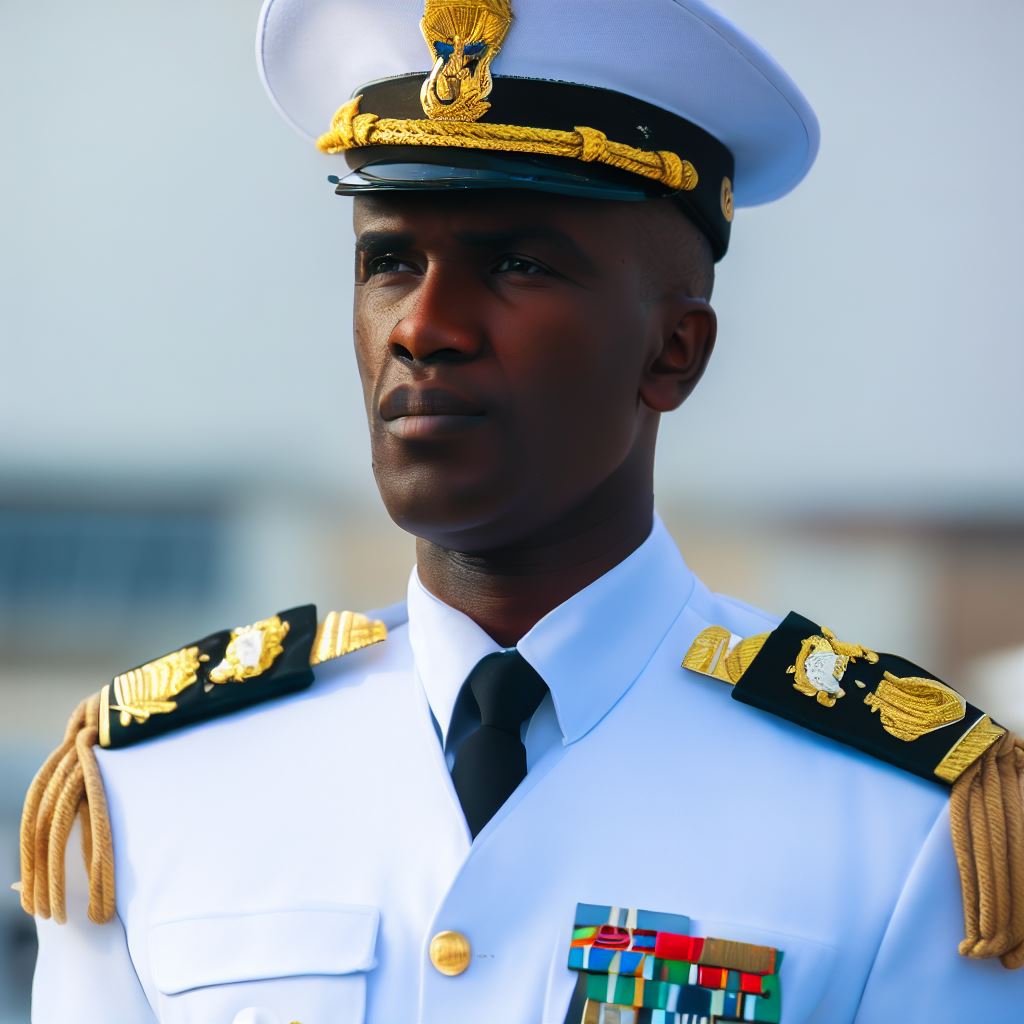Introduction
Ethics plays a crucial role in the context of service, guiding individuals’ behavior and decision-making. Nigerian military officers are responsible for maintaining peace and protecting the nation’s sovereignty.
This blog post aims to explore the ethical considerations and challenges faced by Nigerian military officers in their service.
Introduction to Ethics in the Context of Service
Ethics serves as the moral compass that guides individuals in their actions and choices. In the context of service, such as the military, ethics becomes particularly critical.
It encompasses principles and values that shape the behavior of those in service professions.
Nigerian military officers are entrusted with the responsibility of safeguarding the nation’s peace and sovereignty.
Their dedication and commitment are evident in their willingness to risk their lives in defense of the country. However, the nature of their service presents unique ethical considerations and challenges.
These officers face dilemmas that require them to balance conflicting duties and obligations.
The Nigerian military operates in a complex environment, dealing with issues like insurgency, terrorism, and national security.
In such circumstances, officers must navigate ethical gray areas, often making difficult decisions that can impact the lives of individuals and the nation as a whole.
Moreover, the Nigerian military faces criticisms and allegations of human rights abuses, corruption, and lack of accountability.
These challenges strain the ethical fabric of the institution and raise questions about the conduct of its officers.
To maintain public trust and credibility, Nigerian military officers must uphold high ethical standards and address these concerns responsibly.
This blog post aims to delve deeper into the ethical considerations and challenges faced by Nigerian military officers.
By examining specific scenarios and the principles guiding their conduct, we can gain a better understanding of the intricate moral landscape within which these officers operate.
It is essential to appreciate the complexity of their service and the ethical dilemmas they encounter while working towards the greater good of their nation.
Definition of Ethics in Service
Meaning and Significance of Ethics in a Service-Oriented Profession
Ethics in a service-oriented profession refers to the moral principles and values that guide the conduct and behavior of individuals serving in such professions.
It encompasses the importance of honesty, integrity, and accountability in carrying out their duties. In the context of the Nigerian military officers, ethics play a vital role in shaping their actions and decisions.
As individuals entrusted with the defense and protection of the nation, their actions must be in line with ethical standards to ensure the well-being of citizens and maintain public trust.
Ethics in a service-oriented profession is significant because it establishes a foundation for professionalism and establishes a code of conduct that professionals must adhere to.
It sets the standards by which their actions and decisions are evaluated, promoting responsible and honorable behavior.
Ethical behavior is crucial for military officers as it directly affects their reputation and effectiveness.
Upholding ethical standards promotes professionalism, trust, and loyalty among subordinates and fosters an environment conducive to achieving mission objectives.
Conversely, unethical behavior undermines trust, damages the reputation of individuals and the military as a whole, and reduces effectiveness.
Impact of Ethical Behavior on the Reputation and Effectiveness of Military Officers
Ethical behavior is paramount in determining the reputation and effectiveness of military officers. It directly influences how they are perceived by their subordinates, colleagues, and the general public.
When military officers demonstrate ethical behavior consistently, it instills trust and confidence in their leadership.
The reputation of military officers is closely tied to their adherence to moral and ethical standards.
Officers who prioritize ethical behavior inspire loyalty and respect among their subordinates, enabling them to effectively carry out their missions.
Additionally, ethical behavior enhances the effectiveness of military operations.
By upholding the values of integrity, honesty, and accountability, military officers create an environment conducive to teamwork, trust, and cooperation.
This fosters a strong and resilient military organization capable of achieving its objectives efficiently.
Conversely, any breach of ethical behavior by military officers can have severe consequences.
It not only tarnishes their individual reputation but also undermines the reputation and effectiveness of the entire military organization.
Unethical behavior erodes trust within the ranks, creates disunity, and reduces the willingness of subordinates to follow orders.
Moreover, unethical behavior can have wider implications on the image of the military in society.
The actions of a few officers can negatively impact public perception of the entire institution, leading to a loss of public trust and support.
It may also result in legal and disciplinary actions that further damage the reputation and effectiveness of military officers.
In fact, ethics in a service-oriented profession, such as the Nigerian military, entails following moral principles and values to guide one’s conduct.
Military officers must embody ethical behavior to fulfill their responsibilities and maintain the trust of the Nigerian people.
Read: Leadership Skills: Being an Officer in Nigeria’s Army
The Role and Responsibilities of Nigerian Military Officers
Duties and obligations of Nigerian military officers
- Maintaining national security and defending the country from internal and external threats.
- Providing support during times of crisis, such as natural disasters or civil unrest.
- Participating in peacekeeping missions and promoting stability in the region.
- Training and mentoring junior officers and soldiers.
- Adhering to the chain of command and following orders from higher-ranking officials.
- Ensuring the proper use and maintenance of military equipment and resources.
- Upholding discipline and promoting a culture of professionalism within the military.
Importance of upholding ethical standards while serving the nation
Nigerian military officers have a moral and professional obligation to uphold ethical standards while serving the nation.
By adhering to ethical principles, they build trust and maintain the integrity of the military.
Ethical behavior ensures that officers act in the best interest of the nation and its citizens, fostering a sense of justice and fairness within the military.
Upholding ethical standards also promotes accountability and transparency within the military.
Officers must demonstrate honesty and integrity in their actions, whether it is in handling finances, interacting with the public, or making critical decisions.
By doing so, they set an example for their subordinates and inspire confidence among the civilian population.
The ethical dilemmas faced by military officers in carrying out their responsibilities
Military officers often encounter ethical dilemmas that require difficult decision-making. One such dilemma is balancing the need for national security with respect for human rights.
Officers must navigate situations where the use of force may be necessary to protect the country, yet they must also ensure that this force is proportional and does not infringe upon the rights of innocent civilians.
Another ethical challenge is dealing with corruption and nepotism within the military.
Officers may face pressure to engage in unethical practices, such as accepting bribes or favoring certain individuals based on personal connections.
It is crucial for officers to resist such temptations and prioritize the welfare and interests of the nation and its citizens.
Furthermore, military officers may face ethical dilemmas when it comes to whistleblowing and reporting misconduct within their ranks.
Reporting misconduct, especially when it involves higher-ranking officials, can be risky and may lead to retaliation.
However, by speaking up and exposing wrongdoing, officers contribute to the integrity and improvement of the military.
Ultimately, military officers must make ethical decisions that align with their duty to serve and protect the nation, mindful of the impact their actions have on the lives of individuals and the reputation of the military as a whole.
Read: Training at Nigeria Military Academies: A Guide
Ethical Challenges Faced by Nigerian Military Officers
Corruption and Bribery in the Military
The Nigerian military has been plagued by rampant corruption and bribery, which undermines its effectiveness.
Corruption erodes the trust between officers and their subordinates, leading to a breakdown in discipline.
Bribery allows individuals to circumvent the rules and regulations, compromising the integrity of the military.
Human Rights Abuses and Violations
Nigerian military officers have been involved in numerous human rights abuses and violations.
These include extrajudicial killings, torture, arbitrary arrests, and sexual violence against civilians.
Such actions not only go against international standards but also undermine the credibility of the military.
Misuse of Power and Authority
Some Nigerian military officers abuse their power and authority for personal gain or to settle personal scores.
They engage in unlawful activities, including illegal detentions, extortion, and intimidation of civilians.
This misuse of power not only erodes public trust but also fosters a culture of impunity within the military.
Lack of Accountability and Transparency
Nigerian military officers often operate without any form of accountability or transparency.
There is a lack of proper mechanisms to investigate and punish those responsible for misconduct or unethical behavior.
This lack of accountability allows unethical conduct to persist and tarnishes the reputation of the military.
Impacts of Unethical Conduct on the Civilian Population
The unethical conduct of Nigerian military officers has severe consequences for the civilian population.
Innocent civilians are subjected to violence, displacement, and loss of property at the hands of military personnel.
Such actions breed resentment and undermine the legitimacy of the military in the eyes of the people.
The negative impacts on civilians also hinder the process of post-conflict reconciliation and peacebuilding.
Overall, the Nigerian military faces significant ethical challenges that need to be addressed urgently.
Efforts must be made to tackle corruption, ensure respect for human rights, promote accountability, and restore public trust.
Only by confronting these challenges head-on can the Nigerian military regain its moral standing and fulfill its essential role in safeguarding the nation.
Read: Women in Nigeria’s Military: Breaking Barriers

Efforts to Address Ethical Concerns within the Nigerian Military
Initiatives, policies, and measures implemented to promote ethical conduct
- Introduction of a Code of Conduct outlining expected ethical behavior.
- Establishment of the Directorate of Ethics and Values in the Nigerian Army.
- Implementation of a robust disciplinary system to address breaches of ethics.
- Regular audits and inspections to enforce compliance with ethical standards.
- Creation of a confidential reporting mechanism to encourage reporting of unethical behavior.
- Collaboration with international organizations to learn best practices in promoting ethical conduct.
The role of training and education in instilling ethical values
- Mandatory ethics training for all military personnel at different stages of their careers.
- Incorporation of ethical scenarios and dilemmas in training exercises to develop ethical decision-making skills.
- Integration of moral and ethical teachings in military education curriculum.
- Regular workshops and seminars to reinforce ethical values and principles.
The importance of leadership and strong ethical role models within the military
- Emphasis on leadership by example through the conduct of senior military officers.
- Inclusion of ethical leadership training for officers in leadership positions.
- Recognition and promotion of officers who demonstrate strong ethical values.
- Implementation of a mentoring program to cultivate ethical leadership skills.
- Regular evaluation and assessment of leaders’ ethical performance.
Read: Paths to Becoming a Military Officer in Nigeria
Case Studies: Notable Examples of Ethical Dilemmas Faced by Nigerian Military Officers
Real-life Examples of Ethical Challenges Encountered by Nigerian Military Officers
- The case of Lieutenant Colonel Adekunle: He was faced with the decision to follow orders to execute innocent civilians or protect them.
- Major Ibrahim’s dilemma: He discovered corruption within his unit but was torn between reporting it or staying silent to avoid retaliation.
- Captain Amina’s moral conflict: She witnessed her superiors engaging in human rights violations, but speaking up could jeopardize her career.
- Colonel Yakubu’s ethical quandary: He was pressured to cover up a massacre committed by his soldiers during a peacekeeping mission.
Implications of these Case Studies on the Ethical Landscape of the Nigerian Military
These case studies highlight the prevalent ethical dilemmas faced by Nigerian military officers and the consequences they have on the ethical landscape:
- Erosion of trust and public perception of the military.
- Compromised human rights and violation of international laws and treaties.
- Creation of an environment of fear and intimidation.
- Undermining military’s effectiveness and professionalism.
Lessons Learned from these Cases and Potential Solutions
These case studies provide important lessons and potential solutions for addressing ethical challenges in the Nigerian military:
- Strengthening ethics training: Emphasize moral values, legal obligations, and consequences of unethical behavior.
- Promoting a culture of whistleblowing: Ensure officers feel protected when reporting corruption or human rights abuses.
- Implementing transparent and independent investigation mechanisms: Hold officers accountable for their actions and bring justice to victims.
- Encouraging ethical leadership: Promote senior officers who exemplify integrity and hold others accountable.
- Collaboration with civil society organizations: Engage NGOs and local communities to monitor the conduct of military operations.
These measures can help foster a more ethical landscape within the Nigerian military, ensuring officers are equipped to navigate ethical challenges while upholding their duty to serve and protect.
The Way Forward: Improving Ethics in the Nigerian Military
Identify areas for improvement in promoting ethical behavior
In order to improve ethics within the Nigerian military, it is crucial to identify areas for improvement in promoting ethical behavior.
Strengthening ethical training programs should be a priority, incorporating realistic scenarios and case studies to enhance soldiers’ decision-making skills.
Additionally, a comprehensive code of conduct must be developed, clearly outlining the expected ethical behavior for military personnel.
Strategies for addressing the root causes of ethical concerns
Addressing the root causes of ethical concerns requires strategic action.
The recruitment process should be enhanced, focusing on selecting individuals with strong moral character and values from the beginning.
To foster a culture of accountability, leaders must be held responsible for the actions of their subordinates, and consistent disciplinary actions must be implemented for those found guilty of ethical misconduct.
Furthermore, conducting regular internal audits will help identify systemic issues contributing to ethical concerns, enabling necessary changes to be made.
roviding adequate resources and support for military personnel is also essential, as it empowers them to carry out their duties ethically without compromises.
Importance of collaboration between the military, government, and civil society
Collaboration between the military, government, and civil society is of utmost importance when addressing ethical concerns.
Joint task forces should be established, bringing together representatives from these three entities to work collectively on finding solutions.
Regular dialogues and consultations should be held to gather input and diverse perspectives, ensuring a well-rounded approach.
Mechanisms for civilian oversight should be developed to ensure transparency and accountability within the military’s activities.
This oversight will help maintain public trust and confidence in the institution.
Lastly, collaborations on public awareness campaigns can effectively promote ethical values and emphasize the importance of upholding them within the Nigerian military.
In review, improving ethics in the Nigerian military requires a multi-faceted approach.
By identifying areas for improvement, addressing root causes, and emphasizing collaboration, the military can foster an environment of integrity, professionalism, and accountability.
This, in turn, will enhance the overall effectiveness and legitimacy of the Nigerian military while serving the best interests of the nation.
Conclusion
In this blog post, we have discussed the ethics of service among Nigerian military officers. It is crucial to reiterate the significance of ethics in their role and responsibilities.
As we reflect on the topic, let us ask ourselves: How can we ensure ethical conduct in the Nigerian military?
What actions can we take to promote accountability and integrity? It is up to each of us to initiate positive change and uphold ethical standards in our armed forces.
Together, we can build a stronger and more honorable military for the future.




